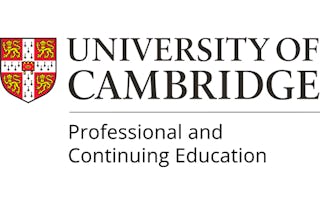This course is an introduction to human cognition and how it is explored. You will explore how Psychology was born as a separate discipline and how we began to study the nervous system in terms of functions, abilities and traits linking brain, mind, behavior and relationship with the environment.

Introduction to Cognitive Psychology and Neuropsychology
6 days left! Gain next-level skills with Coursera Plus for $199 (regularly $399). Save now.

Introduction to Cognitive Psychology and Neuropsychology
This course is part of The science of mind and decision making Specialization
11,469 already enrolled
Included with
(73 reviews)
Skills you'll gain
Details to know

Add to your LinkedIn profile
5 assignments
See how employees at top companies are mastering in-demand skills

Build your subject-matter expertise
- Learn new concepts from industry experts
- Gain a foundational understanding of a subject or tool
- Develop job-relevant skills with hands-on projects
- Earn a shareable career certificate

There are 6 modules in this course
What's included
1 video2 readings1 discussion prompt
This module will give an overview of the main ideas that underlie modern research in psychology. Content will explore key debates such as the nature and nurture discussion and their role in forming personality and behaviour; the relationship between brain, mind and behaviour and the extent to which the mind-body system can be observed and investigated scientifically; the extent of plasticity in the adult brain; and the extent to which the mind can be conceived in a modular way, with different functions regulated by different neural paths. This will stimulate a critical understanding of psychology in a broad way and of the principles at the heart of its research.
What's included
3 videos1 reading1 assignment1 discussion prompt1 plugin
This module explores the key research methods of psychology. It will outline the most important techniques at the heart of cognitive psychology and evaluate the contribution they can make to what we now know about the mind and its development. Content will introduce the role of neuropsychological research in understanding how brain lesions can help us understand how the brain normally functions. A review of the key neuroimaging techniques will be given, including magnetic resonance imaging (MRI), functional magnetic resonance imaging (fMRI), positron emotion tomography (PET), electroencephalogram (EEG), magnetoencephalography (MEG) and single cell recordings. The podcast will also consider techniques for actively manipulating neural activity (e.g. transcranial magnetic stimulation (TMS) and transcranial direct current stimulation (tDCS).
What's included
3 videos1 reading1 assignment1 discussion prompt1 plugin
This module provides an introduction to the study of language and to the core aspects of language processing. Particular focus will be given to how we learn language and whether we have an innate predisposition to language acquisition. Content will provide an overview of the main theories of language acquisition and the nature of the learning context, discussing the theory of shared attentional orienting (between the parent and the infant) during language development. Lectures will also provide an overview of the different components of language from phonology and morphology to semantics and syntax.
What's included
2 videos2 readings1 assignment1 discussion prompt6 plugins
This module will introduce the concepts of working memory and the most influential models theorised to explain its role. We will also explore evidences for the idea of a ‘phonological loop’ and ‘visuo-spatial’ sketchpad for short term memory. Content will also highlight how language and memory interact with perception to facilitate some aspects of our daily life. In particular, cross-modal effects will be explored, that is how one sensory system (for example what we see) can influence another sense (what we hear); or how perception and language have an influence on each other (such as how language influence how we see colours); or how perception influences memorization.
What's included
4 videos2 readings1 assignment1 discussion prompt4 plugins
This module will explore the idea of attention and the idea that our experience is shaped by what we focus on. In particular, this week will be dedicated to the influence of attention in our mind’s life and on how our internal and external landscape is designed by our attention (such as the role of attention on memory, language and perception). Videos will also discuss cases of impaired attention and the symptoms it causes (such as the visual spatial neglect). Finally, the session will also provide an overview of the relationship between attention and consciousness, of their co-dependency as well as dissociation. Content will also be dedicated to the relationship between consciousness and free will.
What's included
3 videos1 reading1 assignment2 discussion prompts4 plugins
Earn a career certificate
Add this credential to your LinkedIn profile, resume, or CV. Share it on social media and in your performance review.
Instructors


Offered by
Explore more from Psychology
 Status: Preview
Status: PreviewUniversity of Toronto
 Status: Free Trial
Status: Free TrialUniversity of Cambridge
 Status: Free Trial
Status: Free TrialUniversity of Cambridge
 Status: Preview
Status: PreviewO.P. Jindal Global University
Why people choose Coursera for their career

Felipe M.

Jennifer J.

Larry W.

Chaitanya A.
Learner reviews
- 5 stars
83.56%
- 4 stars
10.95%
- 3 stars
4.10%
- 2 stars
1.36%
- 1 star
0%
Showing 3 of 73
Reviewed on Jul 14, 2025
Essential understanding of psychology and neuroscience, on how the mind or brain works, and how scientists use imaging and behaviour to study it.
Frequently asked questions
To access the course materials, assignments and to earn a Certificate, you will need to purchase the Certificate experience when you enroll in a course. You can try a Free Trial instead, or apply for Financial Aid. The course may offer 'Full Course, No Certificate' instead. This option lets you see all course materials, submit required assessments, and get a final grade. This also means that you will not be able to purchase a Certificate experience.
When you enroll in the course, you get access to all of the courses in the Specialization, and you earn a certificate when you complete the work. Your electronic Certificate will be added to your Accomplishments page - from there, you can print your Certificate or add it to your LinkedIn profile.
Yes. In select learning programs, you can apply for financial aid or a scholarship if you can’t afford the enrollment fee. If fin aid or scholarship is available for your learning program selection, you’ll find a link to apply on the description page.
More questions
Financial aid available,





